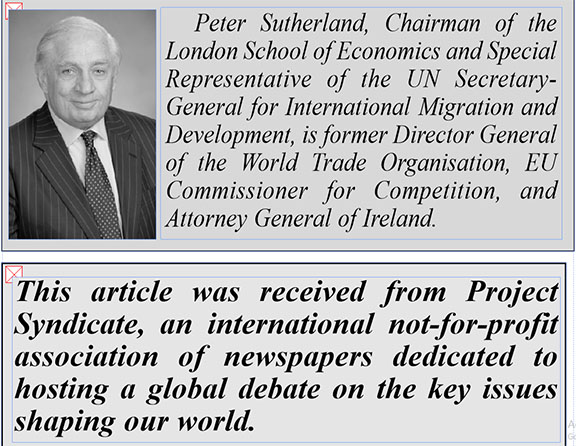By Peter Sutherland
LONDON – On both sides of the Atlantic, anti-immigrant politics are undermining democracies and damaging lives. Far-right nationalist parties are gaining traction in Europe, while millions of undocumented migrants suffer in the shadows. In the United States, President Barack Obama, concerned about his party’s ability to retain control of the Senate, has decided to put off immigration reform until after the election in November.

The most important finding of the GMF’s Transatlantic Trends survey is that concern about immigrants falls sharply when people are given even the most basic facts. For example, when asked if there are too many immigrants in their country, 38% of the Americans surveyed agreed. But when respondents were told how many foreigners actually reside in the US before being asked that question, their views changed significantly: just 21% replied that there were too many.
The same was true in country after country. In the United Kingdom, 54% of respondents said that there were too many immigrants; that number fell to 31% among those who were given the facts about foreigners. In Greece, 58% became 27%; Italy went from 44% to 22%; and so on.
The only countries without such a gap were those with either very little immigration, like Poland, or those with a more open, informed, and progressive political debate about immigration, like Sweden and Germany.
Other surveys have exposed extraordinary inaccuracies in perceptions of migrants. In many developed countries, for example, the public believes that there are three times as many immigrants residing in their country as there really are. The average Briton believes that 34% of UK residents are foreigners; the true number is just 11%.
Such distortions disappear in countries where migration challenges are confronted openly, discussed reasonably, and addressed with conviction. The average Swede, for example, believes that 18% of the country’s population is composed of migrants; the actual number is close to 13%. As a result, populism in these societies is not on the rise, and mainstream politicians do not vilify minorities and migrants.
This constitutes strong evidence that reality-based debate and policymaking can fundamentally transform the negative political dynamics generated by migration. It also suggests that, by failing to engage voters on the
reality of migration, mainstream politicians in Europe are manufacturing support for extremist parties. This self-inflicted political wound is extremely dangerous.
The Transatlantic Trends survey also shows that the American public is not worried about legal migration, while around two-thirds believe that the children of immigrants are being well integrated into their communities. These findings should embolden policymakers to be more proactive in designing pathways for legal migration and policies to integrate migrants.
Even when it comes to illegal immigrants, though US citizens express concern, they are more reasonable than their political leaders about how to solve the problem. A plurality of Americans surveyed by the GMF, for example, said that illegal immigrants should be allowed to obtain legal status.
A deliberative approach to engaging the public on other aspects of migration also could help quell anti-migrant sentiment. For example, recent research t the net fiscal contribution per migrant amounted to €3,300 ($4,260) in 2012. Such data upend the conventional wisdom that migrants are a drain on public services.
Of course, migration creates real challenges for communities and can lead to job losses and lower wages for native workers. But here, too, it is the absence of attention to these issues, not necessarily the presence of migrants, that is the problem.
Implementing vigorous retraining policies, for example, would be a better way to counter these adverse effects than calling for mass deportations. This is one reason why labor unions, which once opposed immigration across the board, are now far more supportive of measures that would legalize undocumented workers and create more pathways for migration.
Informed public debate is the sine qua non of a democratic polity. In its absence, bias and populism prevail. The immigration debate will never be an easy one, but it can become less tendentious and more deliberative if its participants consider the facts.






